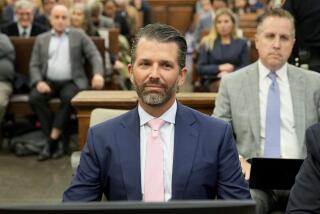Former Enron CEO’s Decision to Testify a High-Stakes Strategy
- Share via
HOUSTON — Jeffrey K. Skilling’s appearance Thursday before a House committee evoked Sgt. Schultz--the “Hogan’s Heroes” TV character who famously insisted “I know nothing.” But legal experts expressed skepticism and said the former Enron Corp. chief executive took a big gamble by agreeing to testify.
In testimony, Skilling stressed that he “was not aware of any financing arrangements designed to conceal liabilities or inflate profitability” at the company before he resigned Aug. 14.
He said he did not recall key details of the off-the-books partnerships that helped trigger Enron’s collapse when their losses were disclosed.
Skilling’s assertion that he was unaware of the company’s underlying problems came after mounting evidence compiled by congressional investigators that Enron executives were warned of potential problems.
“It was a major mistake for him to testify, and he painfully proved it,” said T. Gerald Treece, associate dean of South Texas College of Law. “I’m sure his lawyers were bashing their heads in the wall as he was talking.”
Skilling, Treece said, may have believed he was merely defending himself.
“But there are real lawyers at the Justice Department and real lawyers who are civil litigators who now have sworn testimony from him that they don’t have from any of the insiders who took the 5th Amendment,” he said.
Enron lawyer Jordan Mintz and Jeffrey McMahon, previously Enron’s treasurer and now its president, testified Thursday that they had alerted Skilling to trouble in the partnerships.
But Skilling, they said, brushed aside their concerns.
Grilled about this by the lawmakers, Skilling said he did not receive a series of memos from Mintz and disputed McMahon’s account of a March 2000 meeting in which, McMahon said, he approached Skilling with concerns about the partnerships.
Brian O’Neill, a veteran Los Angeles criminal defense lawyer, indicated that he would have not have let Skilling testify unless there was an extremely good reason.
“You don’t use a strategy like this unless the stakes are pretty high. The stakes in this case are getting close to life-ending,” O’Neill said.
Another longtime Los Angeles lawyer, Mark Geragos, said the success of an “I didn’t know” defense “depends on the document trail.”
“In this case, I think he’s got a better shot than most because some of these documents were not signed by him,” Geragos said.
In Enron’s heyday, Skilling explicitly modeled the company on General Electric Co., which put him in the role of GE’s legendary Jack Welch: the all-knowing, all-powerful chief executive.
But Skilling gave a contrary impression at least once. Talking in April 2000 to two University of Virginia business school professors who were writing a study of Enron, Skilling depicted himself as isolated in the executive suite.
“If you are closer to the transaction, or closer to the business we’re doing, and have a problem with it, how do you expect me to know what that problem is? I’m up here in the 50th floor in the library. I have no idea what’s going on down there” in other offices, he said.
Skilling’s claim that he was unaware of the financial time bombs was derided Thursday on Capitol Hill. Rep. Edward J. Markey (D-Mass.) called it the “Sgt. Schultz defense: ‘I see nothing. I hear nothing.’ ”
Gilbert R. Whitaker, dean of the Jesse H. Jones Graduate School of Management at Rice University, called the explanation plausible.
“But whether it’s believable is another story,” he said. “Most chief executives pretty much have their finger on the pulse of everything that’s critical.”
So why did Skilling, unlike four of his former colleagues, testify?
Treece had an explanation: “He thought he could talk his way through this.”
More to Read
Inside the business of entertainment
The Wide Shot brings you news, analysis and insights on everything from streaming wars to production — and what it all means for the future.
You may occasionally receive promotional content from the Los Angeles Times.










